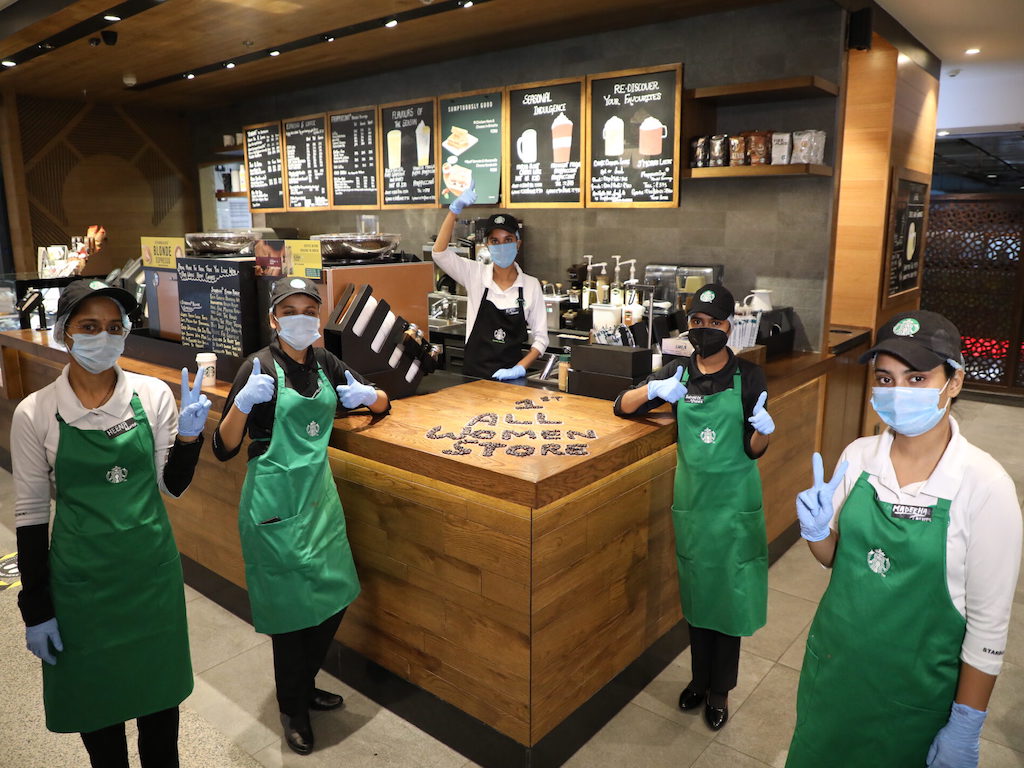3 Mins Read
Tata Starbucks, the joint venture that owns and operates Starbucks outlets in India, has just opened two new stores in Delhi and Mumbai that are entirely run and operated by female staff. The new all-women Starbucks stores are a part of the company’s initiative to increase the representation of women in the workforce.
Earlier this month, Tata Starbucks announced the opening of two new Starbucks locations that are staffed entirely by women. The first is located in the centre of Delhi at Shivaji Stadium, and the second is situated in the Goregaon district of Mumbai along the Western Express Highway.
“We are proud to open these all-women stores that will increase our commitment to diversity and inclusion in India and empower our female partners in new and meaningful ways,” said Navin Gurnaney, CEO of Tata Starbucks, in a press release.
The move is a part of the firm’s ongoing efforts to address systemic inequities in opportunities for female workers within the country, with the goal of ensuring women make up at least 40% of its total workforce by the end of 2022, up from the current 28%. It also announced that the number of female-led stores in India will double by the end of this year.
We are proud to open these all-women stores that will increase our commitment to diversity and inclusion in India and empower our female partners in new and meaningful ways.
Navin Gurnaney, CEO of Tata Starbucks
“Tata Starbucks remains focused on creating and strengthening opportunities for women and fostering diversity across our organisation,” added Gurnaney, who said the firm will continue to support the Brew of Balance initiative, which offers women flexible schedules, support for those returning from maternity leave, child care assistance and access to other family leave arrangements.
In the wake of global movements against racial discrimination and other social exclusion in the workplace, brands and companies have been facing increasing pressure to ramp up their commitments to diversity and inclusion. Recent market surveys have shown that consumers are more willing than ever before to speak out against brands that fail to take a stand on social and environmental issues.
Tata Starbucks’ reaffirmation of its commitment to women’s empowerment comes after similar moves by other large corporations, such as fashion giant Kering, who recently appointed women’s rights and sustainability celebrity activist Emma Watson to its board.
Tata Starbucks remains focused on creating and strengthening opportunities for women and fostering diversity across our organisation.
Navin Gurnaney, CEO of Tata Starbucks
Actions by firms to take gender equality seriously will not only fend off public relations disasters over social and ethical misbehaviour, but will also support companies’ strategies to rebuild from the coronavirus-induced economic downturn, a new report suggests. According to analysts from McKinsey, there is a strong business case to be made for companies to prioritise diversity, equity and inclusion with firms that have strong female leadership outperforming those with a smaller percentage of women in their workforce.
Corporate initiatives that focus on gender parity will also likely have the most social impact in terms of supporting communities that are currently the most vulnerable to the coronavirus crisis.
In July, research from the United Nations showed that women, along with children, elderly and displaced peoples, will be hit the hardest by the effects of the coronavirus and the resultant reversal in a number of sustainable development goals (SDGs) including education, women’s advancement, poverty and income inequalities.
Lead image courtesy of Tata Starbucks.




